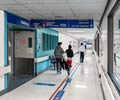Scientists at the UCL Eastman Dental Institute have developed a new tool to combat hospital-acquired infections- antibacterial coating that is activated by light.
Hospital-acquired infections, until now the nemesis of all medical visits, may soon be a thing of the past if a certain new technology works as its inventors hope it will. Scientists at the UCL Eastman Dental Institute have created a new tool - an antibacterial coating that is activated by light.
The research team, led by Zoie Aiken, have tested the new coating with antibacterial properties, and found that it could kill 99.9 percent of Escherichia coli bacteria when a white hospital light was shone on its surface to activate it.Made of titanium dioxide with added nitrogen, the veneer-like surface, when activated by white light-similar to those used in hospital wards and operating theatres-produced a decrease in the number of bacteria surviving on the test surface.
The hospital environment is usually full of microbes responsible for healthcare-associated infections (HCAI).
Thus, there's a need for new ways to prevent the spread of these pathogens to patients.
And it is possible to apply antibacterial coatings to frequently touched hospital surfaces to kill any bacteria present and help reduce the number of HCAI.
Titanium dioxide based coatings can kill bacteria after activation with UV light.
Advertisement
Aiken said: "The activity of the coating will be assessed against a range of different bacteria such as MRSA and other organisms which are known to cause infections in hospitals. At present we only know that the coating is active against Escherichia coli. However, E. coli is more difficult to kill than bacteria from the Staphylococcus group which includes MRSA, so the results to date are encouraging.
Advertisement
"We are also experimenting with different materials such as plastic. As an example, the coating could be applied to a plastic sheet that could be used to cover a computer keyboard on a hospital ward. The lights in the ward will keep the coating activated, which will in turn continue to kill any bacteria that may be transferred onto the keyboard from the hands of healthcare workers."
The study was presented at the Society for General Microbiology meeting in Harrogate.
Source-ANI
TAN/L












